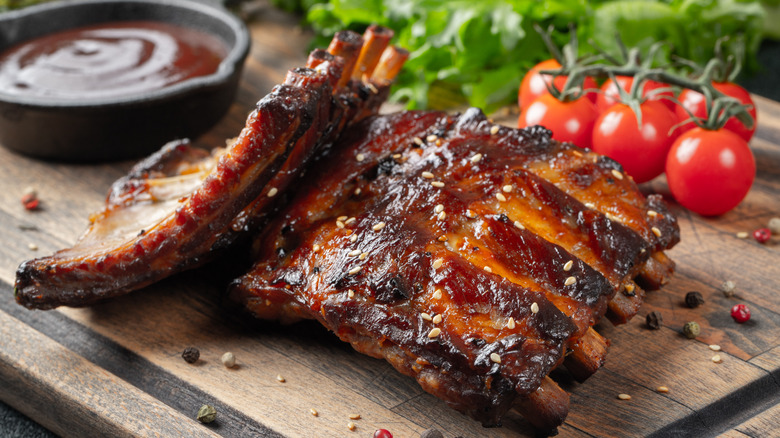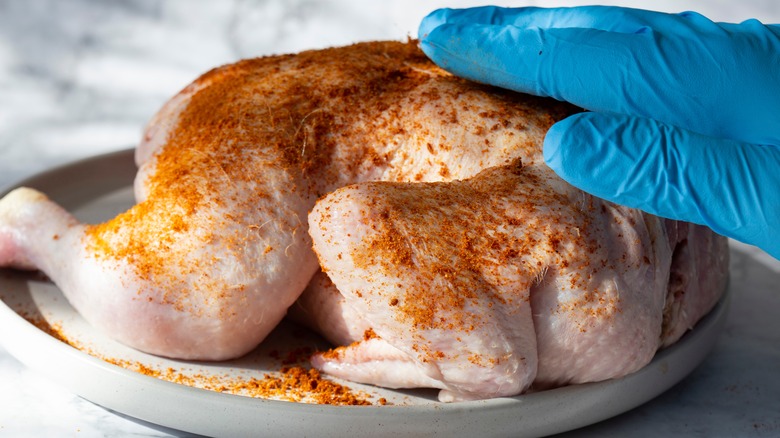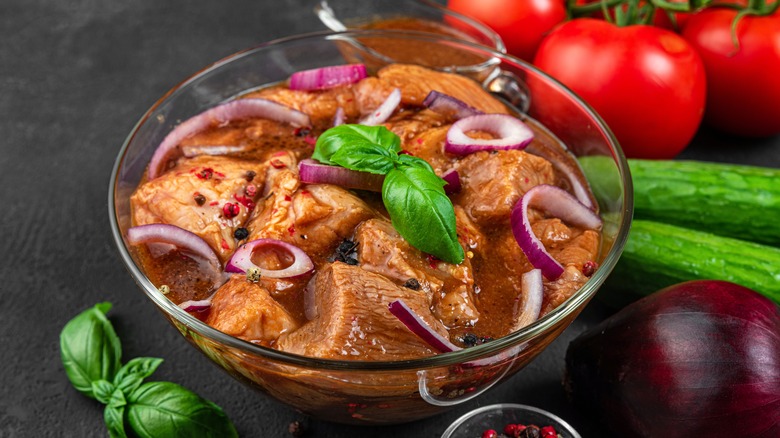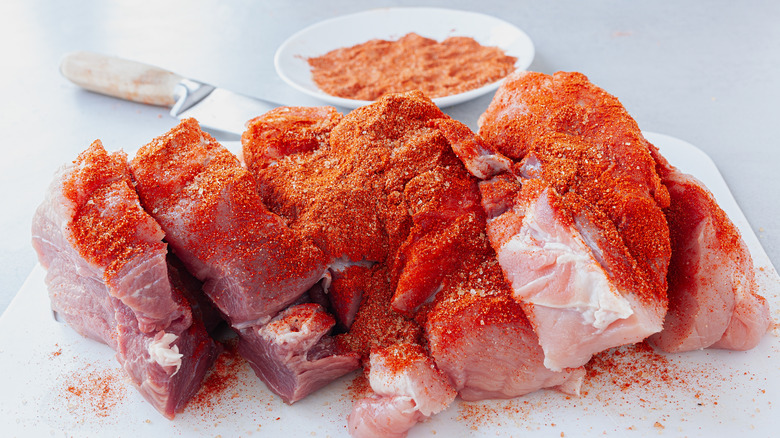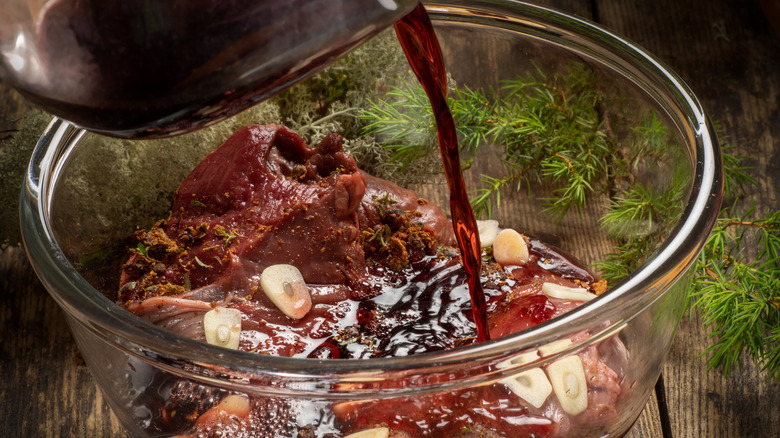What's The Difference Between A Dry Rub And A Marinade?
When it's time to prep meat, the two common methods used to get the most flavor are a dry rub or marinade. These techniques are quite different for a variety of reasons, but both options deliver flavorful chicken, steak, or the protein of your choice. These approaches go far beyond just salting and searing and can take some time, but the payoff is delicious.
As for the differences between a dry rub and marinade, let's start with the basics. A dry rub is a blend of spices and herbs that you use to coat meat before cooking it to add both crunch and flavor. A marinade is a mixture of liquids combined with spices and herbs used to soak meat for a length of time to tenderize. Both of these options can be used on a variety of proteins like beef, chicken, pork, and fish. Marinades also work well with vegetables. Let's dive deeper into the best way to enhance your dishes with a dry rub or marinade.
What is a dry rub?
Dry rubs consist of a blend of herbs, spices, and sugars. A traditional dry rub might include salt, pepper, paprika, garlic and onion powders, dry mustard, and brown sugar. But really, you can use any combination of spices you have on hand in your kitchen. There are also dry rubs with spice blends typical of specific cuisines, and others that use unique ingredients like ground coffee. All of the ingredients are mixed together and rubbed evenly onto a dry piece of meat. The meat is then wrapped and set aside for a few hours, or you can cook it right away. Either way, the result is a crisp, caramelized layer on the outside, providing your meat with more flavor and an improved texture.
You can use dry rubs on just about any protein, including baked chicken wings, whole chickens for roasting, pork chops, and salmon filets. Dry rubs are commonly used on barbecued meats like ribs, pork shoulder, and pork butt. As the meat cooks, the fat keeps it moist while the dry rub caramelizes on the outside. Have some dry rub seasoning left over from a recipe? You can keep it in an airtight container for up to six months.
What is a marinade?
Marinades also consist of a blend of spices and herbs, but they rely on liquids to bring everything together. A common marinade has spices like salt, pepper, and paprika, herbs, and a combination of oil, vinegar for acidity, mustard, and even soy sauce, wine, or Worcestershire sauce depending on the recipe. When you have your marinade mixture whisked together, pierce the meat with a fork, coat it, and place it in an airtight bag or covered container in the refrigerator for at least an hour and up to several hours. Depending on the kind of meat you're working with, you must limit the duration, but we'll get more into that later.
The acidic ingredients like vinegar or juices break down the meat, making it more tender. This explains why piercing the meat and letting it soak for sufficient time is key. Proteins with less fat, like chicken breasts or top sirloin steak, are ideal candidates for a marinade because they will remain moist, especially on the grill. Marinades work great with various cuts of steak like roasts, seafood like salmon and shrimp, and pork chops. You can also marinate vegetables, especially dense varieties like asparagus and carrots. And if you have leftover marinade, pour it down the drain because it was previously in contact with raw meat.
Dry rubs are, well, dry
If you haven't figured it out already, one of the biggest differences between a dry rub and a marinade is that dry rubs are dry. That doesn't mean you won't use some sort of fat or liquid for cooking, but the seasoning process relies solely on a dry mixture of herbs and seasonings. If you're grilling, the fats from the protein will help keep the meat moist. Meanwhile, if you're cooking meat with a dry rub on the stovetop or in the oven, you should use oil or butter to obtain a crispy outer layer.
If you're wondering about the perks of using a dry rub if it doesn't penetrate the meat like a marinade, texture is still central. It helps crisp the outside, which is ideal for searing or grilling meats like chicken or pork. When you cook these proteins, the heat brings moisture to the surface before the outside starts to crisp. Since a marinade already contains a lot of moisture, it won't manage to cook off in time if you're using a quicker cooking method.
Marinades penetrate the meat
Dry rubs just can't compete with one benefit of marinades, which is their ability to get deep into the layers of meat. With time, marinades penetrate the meat, which tenderizes and flavors it. This is why the technique is great for proteins that don't have a high-fat content. Dry rubs only flavor the surface of the meat without tenderizing it, so fattier proteins are a better option here.
It's not totally foolproof, though. Different proteins require different marinating times or you could end up with mush. For example, flaky fish and other seafood should only be marinated for 15 to 30 minutes, because they will break down and lose their natural flavors. Meanwhile, most cuts of chicken are done marinating in two to three hours. For beef and pork, you can marinate for up to 12 hours, but avoid any longer or the protein will also start to break down and become overly soft.
